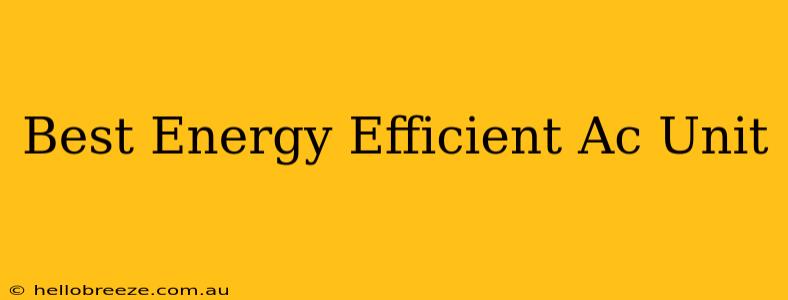Summer heat can be brutal, but your wallet doesn't have to suffer. Choosing the best energy-efficient AC unit is crucial for staying comfortable while keeping your energy bills in check. This guide will help you navigate the world of air conditioners and find the perfect match for your home and budget.
Understanding SEER Ratings: The Key to Efficiency
The Seasonal Energy Efficiency Ratio (SEER) is the most important factor to consider when buying an air conditioner. A higher SEER rating indicates greater energy efficiency. Units with SEER ratings of 16 or higher are generally considered energy efficient, while those above 20 are considered high-efficiency. The higher the SEER rating, the more you'll save on your energy bills over the life of the unit. Investing in a higher SEER AC unit will pay off in the long run.
SEER Ratings Explained:
- SEER 13-15: Good efficiency, a decent balance of cost and performance.
- SEER 16-18: Considered energy efficient, offering better savings.
- SEER 19-20 and Above: High-efficiency units; expect significant energy savings.
Types of Energy-Efficient AC Units:
There are several types of air conditioners available, each with its own set of benefits:
1. Central Air Conditioners:
Central AC systems are the most common type for whole-house cooling. They offer even cooling throughout your home and are usually the most energy-efficient option for larger spaces. Look for central AC systems with variable-speed compressors for enhanced efficiency and comfort. Variable-speed compressors adjust their speed based on cooling needs, reducing energy consumption compared to single-speed models.
2. Ductless Mini-Splits:
Ductless mini-splits are an excellent option for homes without existing ductwork or for cooling individual rooms. They are highly efficient and offer zoned cooling, allowing you to cool only the areas you need. They're great for adding cooling to additions or for targeted cooling in specific rooms.
3. Window Air Conditioners:
Window units are a budget-friendly option for cooling individual rooms. While not as energy efficient as central or mini-split systems, many energy-efficient models are available with high SEER ratings. Look for models with energy-saving features like sleep mode and smart technology.
Factors to Consider Beyond SEER Rating:
- Size: Ensure the unit is properly sized for your space. An oversized unit will cycle on and off frequently, wasting energy. An undersized unit will struggle to cool effectively. Consult with an HVAC professional to determine the correct size.
- Features: Consider features like smart technology, programmable thermostats, and dehumidification capabilities. These features can improve efficiency and comfort.
- Maintenance: Regular maintenance, including filter changes and professional servicing, is essential to maintaining efficiency and prolonging the lifespan of your AC unit.
- Installation: Proper installation is critical for optimal performance and energy efficiency. Hire a qualified HVAC professional for installation.
Choosing the Best Energy-Efficient AC Unit for You:
Choosing the right energy-efficient AC unit involves careful consideration of your needs, budget, and home's characteristics. Don't hesitate to consult with an HVAC professional to discuss your options and get personalized recommendations. They can assess your home's cooling needs and help you select the most appropriate and energy-efficient system. By investing in a high-efficiency AC unit, you'll not only enjoy comfortable temperatures throughout the summer but also save money on your energy bills and reduce your environmental impact. Remember to weigh the initial cost against long-term savings. The best energy-efficient AC unit is the one that best meets your individual needs and helps you stay cool and comfortable while being environmentally responsible.

